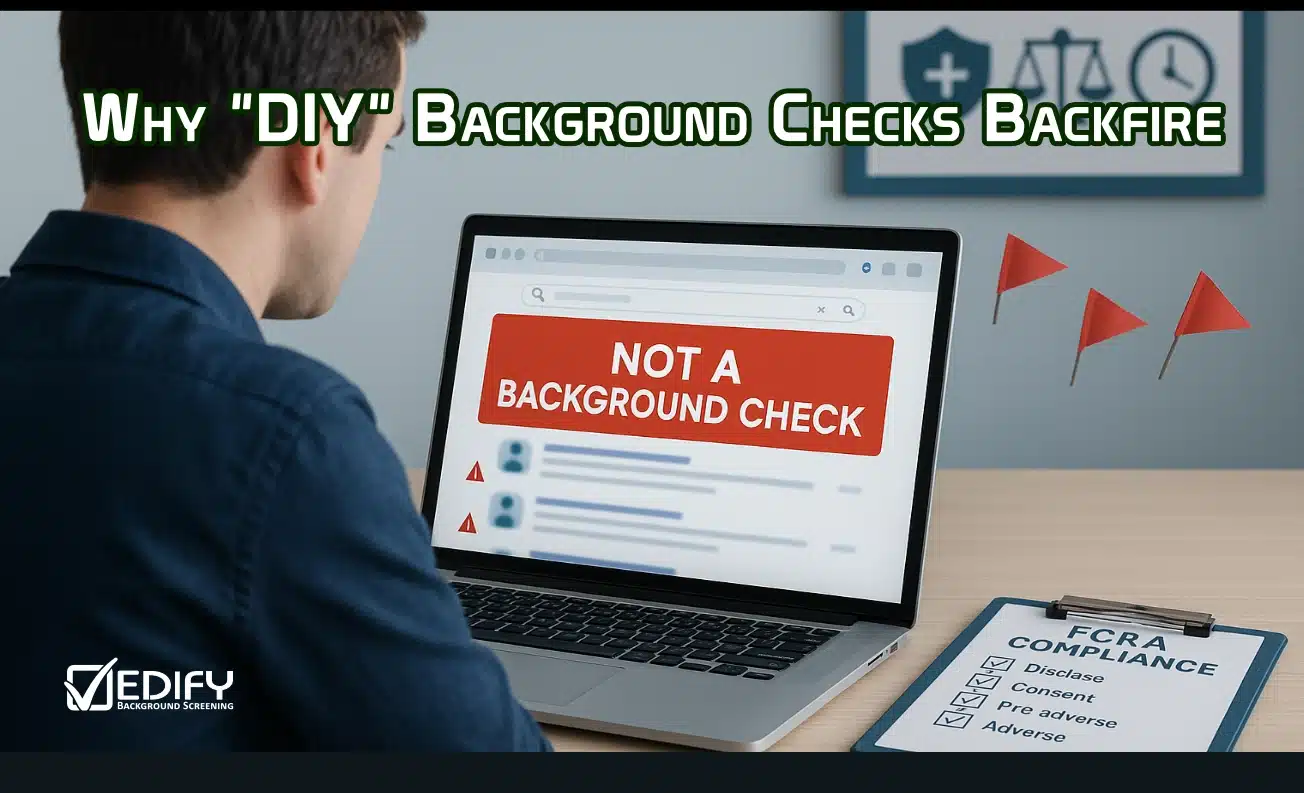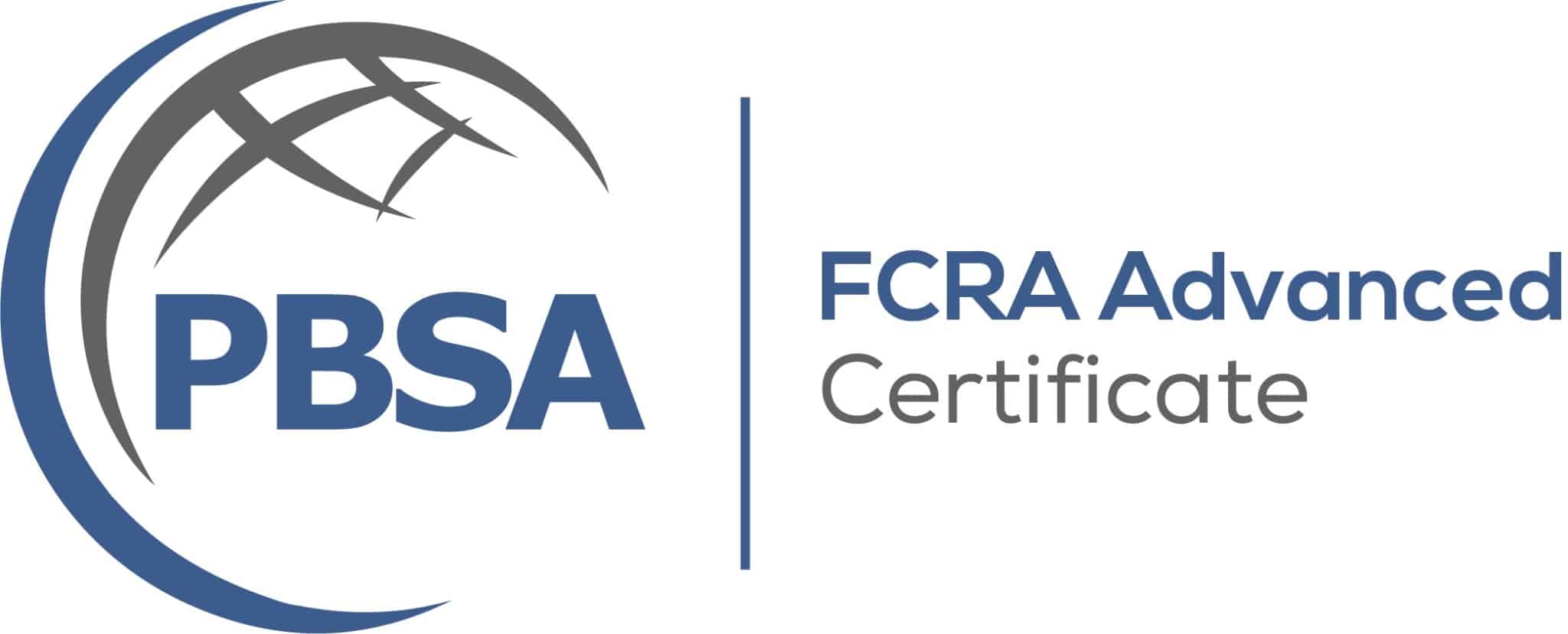Why DIY Background Checks Backfire for SMBs?
Quick answer: DIY background checks are unreliable because they miss records, mix people up, and surface outdated or protected information. They can also be illegal if you use third-party data to make hiring decisions without giving proper FCRA disclosure, getting written consent, and following adverse action steps.
If you’re leaning on Google and gut instinct, you’re not alone. Many small and mid-sized businesses try to screen this way to save time or money. The problem is it creates hidden risk and slows you down later. There’s a simple, legal, repeatable way to screen that protects your business and candidates. If you want a quick primer on how compliant background checks work, start there and come back.
What counts as a “DIY background check”
DIY covers any informal method you or your team use to dig up info outside of a compliant process:
-
Google searches and scanning online news hits
-
Social media “stalking” on LinkedIn, Facebook, Instagram, X, TikTok
-
Spokeo, People-finder, and other data-broker sites marketed to consumers
-
Calling around for “back-channel” references
-
Walking into a random courthouse without knowing which jurisdictions actually matter
Any time you use third-party background info to make a hiring decision, federal law may apply. If a third party is in the business of compiling background information, that’s a consumer report under the Fair Credit Reporting Act (FCRA). That triggers specific steps before and after you look at results.
Accuracy problems that burn time and trust
DIY checks feel fast, until they aren’t. Common failure points:
-
Mismatched identities. Common names, nicknames, and prior addresses lead to false positives.
-
Outdated or sealed records. Clean Slate and expungement actions won’t be obvious in casual searches.
-
Partial coverage. Criminal records are county and state based. A national “database” is never complete on its own.
-
No audit trail. You can’t prove what you reviewed, when, and why you decided.
-
No dispute path. Candidates have rights to see and dispute reports. DIY methods don’t provide a fair process.
Result: more rework, weaker hires, and a higher chance of a discrimination or FCRA complaint.
Why DIY is often illegal (FCRA basics in plain English)
Here’s the simple truth: if you use a third party’s compiled background info to hire, you are in FCRA territory.
What the FCRA expects from employers
-
Give a stand-alone disclosure and get written consent before ordering a report.
-
Provide pre-adverse action if something in the report might lead you to reject, rescind, or change terms. Include the report and the current “Summary of Rights Under the FCRA.”
-
Wait a reasonable period so the candidate can dispute errors.
-
Send a final adverse action notice only after the waiting period, if you still decide not to move forward.
These steps are where most DIY approaches break. Browser tabs and people-search PDFs are not a compliant process, and they don’t meet “maximum possible accuracy” expectations.
Mini checklist you can use today
-
Use a compliant, employment-purpose background check provider.
-
Give disclosure and collect written consent every time.
-
Review results against a job-related decision matrix.
-
If negative info matters, follow pre-adverse action, wait, then final adverse action.
State and local curveballs you won’t catch with DIY
-
Fair Chance/Ban-the-Box timing. Many states and cities say when you can consider criminal history.
-
Clean Slate and expungement. Sealed records should not be used, and filtering varies by state.
-
Social media privacy. Some states restrict what you can ask for or view.
-
Reporting windows and look-back limits. What’s reportable can depend on the job and jurisdiction.
Keeping these straight is hard without tools, policy, and current legal references.
Social media pitfalls: bias on display
Looking at a candidate’s profiles exposes protected class info like religion, disability, age, and pregnancy. That creates a risk that decisions appear biased, even if unintentional.
If you choose to use social media screening, do it carefully:
-
Use a documented, job-related policy.
-
Keep hiring managers shielded from protected-class data.
-
Apply the same process to all finalists for the same role.
-
Save artifacts and notes in a consistent way, or skip it entirely.
It’s not just W-2s: contractors and volunteers count
If a person will access your customers, systems, money, or facilities, they need screening too. That includes 1099 contractors, temps, and volunteers. Your policy should cover all worker types, not just employees.
What “good” looks like: a simple, compliant screening workflow
Here’s a clean workflow you can copy:
-
Pick the right package by role. Customer-facing, finance/IT, safety-sensitive, etc.
-
Disclose and get consent in a stand-alone form.
-
Confirm identity with SSN trace and aliases to route searches.
-
Run jurisdiction-level criminal checks where the candidate lived and worked, plus sex offender and needed registries.
-
Use a decision matrix tied to the job, considering nature, gravity, time since offense, and the role.
-
Handle adverse action correctly if something is job-relevant and disqualifying.
If you need the compliance overview in one place, here’s a plain-English guide to FCRA-compliant employment background checks.
Myth-busting: cost and speed
-
DIY isn’t free. Your time, backfilling a bad hire, and legal risk cost more.
-
Modern screening is quick. Most pre-employment checks return fast with proper scope and identifiers.
-
Transparent pricing exists. See our packages and what’s included in background check pricing.
Simple decision guide: when to run what
Use this as a starting point. Tune to your roles and jurisdictions.
Customer-facing hourly roles
-
Basics: SSN trace and aliases, multi-jurisdiction criminal search with county confirmations, sex offender registry.
-
Add-ons by role: employment verification, drug screening, etc. where trust is critical.
Admin, finance, and IT
-
Everything above, plus education and recent employment verifications.
-
Credit checks only when job-related and allowed.
-
For IT, consider professional reference checks focused on access and change control.
Safety-sensitive and field roles
-
Everything above, plus MVR/DMV for drivers.
-
DOT or other industry checks if regulated.
For a ready-made package that fits lean teams, see small business background checks.
Conclusion
DIY background checks feel fast, but they miss critical info and can put you out of compliance. A simple, consistent, and lawful process helps you hire better and protect your business. If you want clear packages and timelines, here’s our background check pricing.
FAQ
Q: Can I just use Google?
A: You can look, but you should not base decisions on what you find. It’s incomplete, often inaccurate, and can expose protected information. If you use third-party compiled data to decide, you trigger the FCRA.
Q: Do I need consent every time?
A: Yes. Consent must be clear and stand-alone for each employment-purpose check.
Q: What if a people-search site shows something ugly?
A: Do not act on it. Order a proper employment background check. If the result is confirmed and job-relevant, follow pre-adverse and adverse action steps.
Q: How long should I wait after pre-adverse action?
A: Many employers use 5 business days as a baseline, but check your state and policy and ensure the candidate has a fair chance to dispute.
Q: Do volunteers and contractors need screening?
A: If they have access to people, data, or property, yes. Treat them with the same policy and notices.
Q: How often should I re-screen?
A: At minimum on role changes and annually for sensitive roles. Document your cadence.
Additional External Resources to Explore
-
FTC: Using Consumer Reports for Employment
https://www.ftc.gov/business-guidance/resources/using-consumer-reports-what-employers-need-know -
EEOC Enforcement Guidance on Arrest and Conviction Records
https://www.eeoc.gov/laws/guidance/enforcement-guidance-consideration-arrest-and-conviction-records-employment-decisions -
CFPB Circular 2024-06: Background Dossiers and Algorithmic Scores
https://www.consumerfinance.gov/compliance/circulars/consumer-financial-protection-circular-2024-06-background-dossiers-and-algorithmic-scores-for-hiring-promotion-and-other-employment-decisions/ -
SHRM: Updated FCRA Consumer Rights Notice
https://www.shrm.org/topics-tools/news/talent-acquisition/updated-fcra-consumer-rights-notice-required-now-available -
National Reentry Resource Center: Fair Chance/Ban-the-Box overview
https://niccc.nationalreentryresourcecenter.org/resources/ban-box-us-cities-counties-and-states-adopt-fair-hiring-policies
The resources provided here are for educational purposes only and do not constitute legal advice. We advise you to consult your own counsel if you have legal questions related to your specific practices and compliance with applicable laws.













